Browse the glossary:
cost
— The value of the resources that are consumed (e.g. staff time, drugs, use of equipment) as the consequences of an action, such as a treatment choice
Synonyms:
opportunity cost
Full explanation:
Cost includes two components: the resources that are used and the unit cost of those resources.
The unit cost is the value of a unit of resource use; for example, a day in hospital,or an outpatient visit. If resources are bought and sold, the price of each unit of resource (e.g. drugs, staff salaries, rent for buildings) is an indication of the value of those resources.
However, prices vary across and within countries and over time because of factors such as market prices and inflation. Moreover, because markets are not perfect, the price of a unit of resource use does not always provide a good indication of its value.
In treatment comparisons, the cost of a treatment is the incremental cost; i.e. difference in the cost of the resources used in one treatment comparison group and the cost of the resources used in the other treatment comparison group.
Which resources are included (e.g. whether patients’ out-of-pocket costs are included) depends on the perspective that is taken and the time horizon.
Cost and resource use are sometimes used as synonyms, although in economics these terms have different meanings.
See also:
resource use · opportunity cost · incremental cost
Still don't get it?
If you feel that this definition hasn't helped you to understand the term, click on our monkey to let us know.

← controlled study cost-effectiveness →